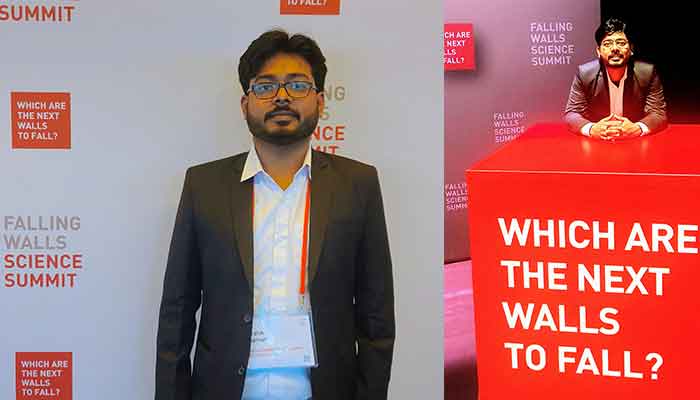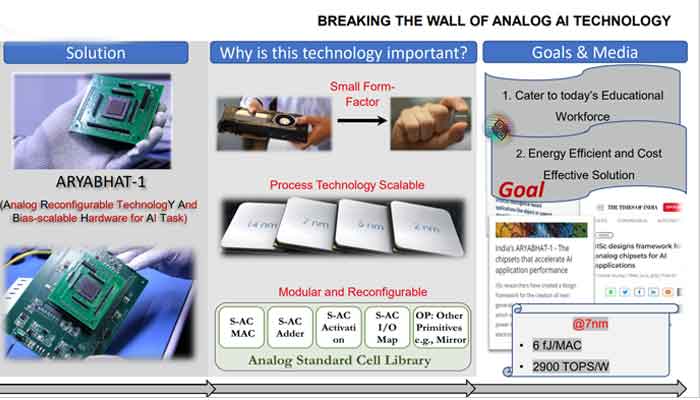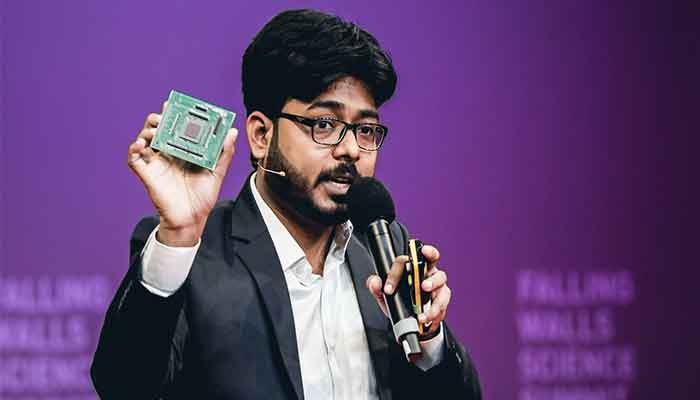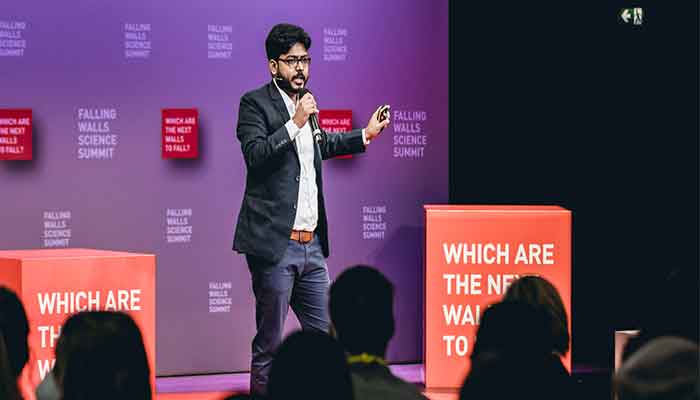IIIT Hyderabad hosted its first Falling Walls Lab last year qualifying the winner, Pratik Kumar for the global finale in Berlin. We look at the international pitch competition that attracts experts, change makers, and luminaries from diverse fields through Pratik’s perspective.
Imagine rubbing shoulders with Nobel Laureates. But before that, imagine condensing four or five years of your research journey and explaining it in a compact 3 minute-period with no more than 2 slides. Pratik Kumar, Doctoral student at the Indian Institute of Science, Bangalore did just that. Pratik is the Falling Walls Lab, Hyderabad winner who qualified for the global finale in Berlin in early November, 2022 with his breakthrough pitch on analog VR accelerated technology. And yes, won a chance to interact and network with the world’s movers and shakers of Science, Business and policy making.

The idea of Falling Walls Lab is to pitch an innovative idea that can have a positive impact on Science and society. Renowned academic institutions across the world host the Falling Walls Lab to showcase “the quality, diversity, and passion of their region’s most innovative minds”. At the IIITH hosted Falling Walls Lab, Pratik’s presentation stood out not only for its innovativeness but also for its potential impact.
Inspired by the working of the human brain, Pratik has attempted to implement a similar energy and area efficiency in the current generation of hardware for artificial intelligence and machine learning.
Breaking The Wall Of Analog Tech
“It was in 2018 when we first started to work on an intelligent chip, specifically meant to accelerate AI and machine learning paths in the analog domain,” says Pratik. Nicknamed Aryabhat-1, short for Analog Reconfigurable Technology and Bias-scalable Hardware for AI Tasks, the patent-pending chip is extremely useful in operations that require massive parallel computing at high speeds. For next-gen analog accelerators, the chip can work in micro watts of power. “This is a game-changer since it works with 1000x lesser power than the existing chips,” states Pratik. A corresponding research goal of his is to develop a portable device in lieu of a bulky server to derive the same level of computing performance. Aligning with the country’s indigenous semiconductor mission, Pratik’s research has yielded the first-of-its-kind indigenous analogue AI-accelerator.


Mecca Of Research Networking
Pratik, who is a part of the NeuRonICS (Neurally Inspired Reconfigurable Intelligent Circuits and Systems) lab working under the guidance of Prof. Chetan Singh Thakur credits the latter for inspiring him to think big. “Sir has always encouraged me to ponder about long-term impact – for the community and the society at large. That’s how the goal of doing something fundamentally different from what the industry was currently engaged in was mooted,” he says. When the goal of novelty was met and it was time to present it on the global platform, Pratik fell back on the words of advice of Prof. Aftab Hussain, who is himself a former international Lab winner and instrumental in bringing the Falling Walls Lab to Hyderabad. “He said two things; one, ‘Don’t be afraid, just go present your idea to the world’. And two; ‘Go and talk to anyone you want.’” Any doctoral student worth his/her salt knows the importance of academic networking. It is the gateway for publishing, collaboration, and exploring post-doctoral career opportunities. But like Pratik woefully admits, “Despite it being an integral part of research, in India, we don’t focus on establishing networks”.

Global Pitch
While participation in the regional edition of the Falling Walls Lab enables one to interact with brilliant minds from one’s own country, a selection here spells an opportunity for a similar interaction with extraordinary researchers from all over the world. Giving a sense of the scale at which the international edition is conducted and its standing in the scientific community, Prof. Aftab recounts, “There was a long waitlist for a German visa but when we contacted the Consulate and informed them about the purpose for which Pratik was applying, the process was expedited for him to attend the event!” Apart from networking which is a huge draw for all participants, a researcher’s presence at the international finale can benefit from all the different kinds of interdisciplinary research areas that are presented. Not to mention the exposure to a myriad number of presentation techniques. Calling it a once-in-a-lifetime experience and urging every young researcher to apply to Falling Labs, Pratik sums up with, “You gain perspective when you come back from Berlin. As researchers, we are all looking at problems the world is facing and trying to create an impact.”

Sarita Chebbi is a compulsive early riser. Devourer of all news. Kettlebell enthusiast. Nit-picker of the written word especially when it’s not her own.


Next post